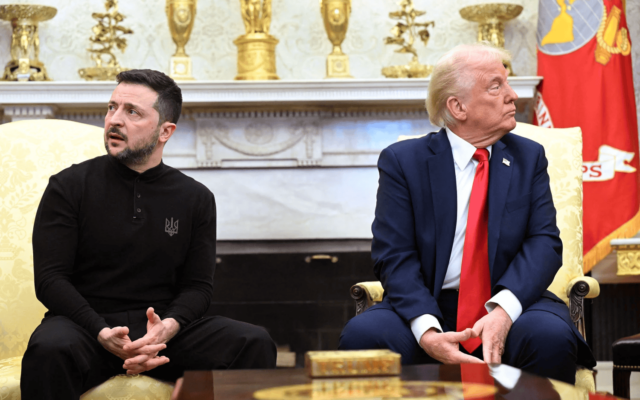A widening rift between Ukrainian President Volodymyr Zelenskyy and U.S. President Donald Trump has reignited concerns about the role of misinformation in shaping public perception and policy decisions regarding the ongoing war in Ukraine. Recent statements from Trump and his administration have mirrored Russian propaganda narratives, raising questions about how disinformation influences international relations and the future of U.S. support for Ukraine (Axios).
Trump’s Claims and Their Origins
During a series of public statements and social media posts, Trump accused Zelenskyy of being a “dictator without elections” and suggested that Ukraine was responsible for the war with Russia. He also falsely claimed that Zelenskyy’s approval rating had fallen to 4% (BBC).
While Trump framed these remarks as his own observations, many of them have been widely circulated by Russian state media. Russian President Vladimir Putin has repeatedly questioned Zelenskyy’s legitimacy, with Kremlin officials arguing that Ukraine’s decision to postpone elections due to martial law makes the government unlawful. In reality, Ukraine’s 2019 elections were deemed free and fair by international observers, and Zelenskyy’s approval rating remains at about 50% (BBC).
The Oval Office Confrontation
Tensions reached a boiling point when Trump and Zelenskyy clashed in a dramatic, televised Oval Office meeting. Trump dismissed Ukraine’s frustrations over being excluded from U.S.-Russia peace talks, suggesting that Kyiv had “three years to end the war” and accusing Zelenskyy of prolonging the conflict. Zelenskyy countered by reminding Trump that Putin violated previous agreements, making negotiations without Ukraine untenable (CNN).
The meeting ended with Trump cutting the conversation short and later posting that Zelenskyy “disrespected the United States” and would not be welcomed back until he was “ready for peace” (CNN).
Russian Response and Amplification
In Russia, government officials and state media outlets seized on Trump’s statements. Dmitry Medvedev, a high-ranking Kremlin official, praised Trump for his stance, calling Zelenskyy an “insolent pig” and endorsing Trump’s claim that Ukraine was “gambling with World War III” (CNN).
Russian Foreign Minister Sergey Lavrov also welcomed Trump’s assertion that Ukraine should make concessions to Russia, reinforcing Putin’s longstanding narrative that the war was provoked by Kyiv and the West. This claim is contrary to historical facts: Russia’s invasion of Ukraine in 2022 was an unprovoked act of aggression, following years of Kremlin-backed insurgency in eastern Ukraine (BBC).
Policy Shifts and Potential Consequences
As tensions escalate, Trump’s administration appears to be reconsidering its commitment to Ukraine. White House officials and Republican leaders have increasingly pressured Zelenskyy to show gratitude for past U.S. aid and consider territorial concessions to Russia. Some have even suggested that Zelenskyy step down to facilitate peace talks (AP News).
European leaders, meanwhile, have doubled down on their support for Ukraine. At a recent summit in London, 19 European nations reaffirmed their commitment to Ukrainian sovereignty, acknowledging that a weakened U.S. stance could shift the balance of the conflict in Moscow’s favor (AP News).
The Broader Implications of Misinformation
Trump’s rhetoric underscores the broader challenge of misinformation in international conflict. His repeated claims—many of which align with Russian propaganda—highlight how disinformation can shape public perception and influence foreign policy. While some of Trump’s supporters argue that he is merely advocating for diplomacy, critics warn that his embrace of Kremlin narratives could embolden Putin and weaken Ukraine’s position in peace talks.
Zelenskyy has insisted that any negotiations must include Ukraine and be based on actual security guarantees, not mere promises. “Without security guarantees, any deal struck with Russia would only serve as a precursor to future aggression,” he said in an interview (AP News).
As the war nears its third anniversary, the growing divide between Washington and Kyiv could reshape the conflict’s trajectory. If the U.S. withdraws its full backing for Ukraine, it may force European allies to take on a more prominent role—an outcome that could significantly alter the balance of power in the region.
References
- Axios. (2025, February 19). Zelensky says Trump “lives in a disinformation space” of Russian propaganda. Retrieved from Axios
- CNN. (2025, February 28). Zelensky invades Trump’s ‘disinformation space’—and it could really hurt Ukraine. Retrieved from CNN
- BBC. (2025, February 19). Fact-checking Trump claims about war in Ukraine. Retrieved from BBC
- AP News. (2025, February 1). AP Interview: Zelenskyy says excluding Ukraine from US-Russia talks about war is ‘very dangerous’. Retrieved from AP News
- AP News. (2025, March 3). Live updates: Trump and his allies lash out at Ukraine’s Zelenskyy and suggest he may need to resign. Retrieved from AP News



